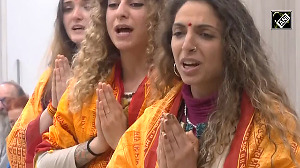Hundreds of yoga enthusiasts across China spread their mats on Saturday to showcase their passion and skills in the ancient Indian physical and spiritual practice on the 10th International Day of Yoga, despite the chill in bilateral ties since the 2020 military standoff in eastern Ladakh.

Year after year, the number of yoga practitioners participating in the official and unofficial events on International Yoga Day in different cities is growing, especially the young people, officials say.
Over 1,000 yoga enthusiasts participated in a two-hour-long programme held by the Indian Embassy in Beijing on Saturday. The event was held a day after the US International Yoga Day to coincide with the weekend holiday.
Indian Ambassador to China Pradeep Kumar Rawat, his wife Shruti Rawat, and Deputy Ambassador Abhishek Shukla besides the officials of the embassy joined the multitude of yoga practitioners at the special event held at the old embassy premises.
The event had many different aspects of the health and wellness traditions of India. While Master Lokesh Sharma, a teacher of Indian culture from the embassy, led the common yoga protocol, there were also special sessions on meditation by renowned professor Dr R S Bhogal, a meditation expert from Kaivalyadhama Yoga Institute in Pune.
The event was held in collaboration with four institutes -- YogiYoga, We Yoga, Om Shiva Yoga and Hemanth Yoga.
The session also had challenges for the participants as enthusiasts tried their hands at the 'Ashtavakrasana' (eight angle pose) and the winner was awarded at the end of the event, T S Vivekanand, First Secretary of the Indian Embassy in-charge of culture, told PTI.
Participants enthusiastically engaged in the common yoga protocol, a standardised yoga practice that includes all aspects of yoga and is suitable for adoption by all age groups, he said. A session on advanced yoga and a yoga challenge was also organised for regular practitioners of yoga, Vivekanand said.
The event included a soulful kirtan performance by N K Singh and a captivating kathak performance by Sohini Karanth, integrating the elements of yoga and meditation.
Huge yoga events were also held by the Indian Consulates in Shanghai and Guangzhou besides the eastern city of Yiwu, the global commodity market where hundreds of Indian businessmen reside, engaging in the export of billions of dollars of Chinese products to India.
Vivekanand said there is more traction from the Chinese participants in yoga events held by the embassy.
While over 270 people took part last year on International Yoga Day, this year nearly 1,000 took part in the event.
Similarly, at the Vasant Mela event held by the embassy in March this year, over 4,500 people took part, highlighting the growing interest in Indian culture, food and yoga.
The increase in numbers in the events despite the bilateral tensions over the eastern Ladakh standoff in the last four years is seen as an encouraging sign by the officials.
For their part, veteran yoga teachers in China say that there is a qualitative difference in the popularity of yoga in China compared to other countries.
The unique feature of yoga culture in China is its popularity among young people in the age group of 20-25 years, Mohan Bhandari, Director of Research at YogiYoga Institute, said.
Young people are taking part in yoga in large numbers compared to other countries where many people begin to take an interest in the Indian physical and spiritual practice after 30 years of age and beyond.
Bhandari, who hails from Rishikesh in India, founded the YogiYoga Institute several years ago with his Chinese wife Yin Yan.
The institute has centres in several Chinese cities and runs training programmes, including yoga healing.
Already those young people who took to yoga are introducing the practice to their children in China as a result the next generation of yoga teachers will come from China, Bhandari told PTI.
Yin Yan, who is the founder president of YogiYoga, says yoga will continue to develop in China because of the needs of the people and its increasing popularity in social life, workplace and the family.
However, despite its growing popularity yoga institutes suffered major reverses during the COVID outbreak as hundreds of them have shut down.
This also rendered scores of Indian yoga teachers working in China to return to India. Bhandari says the yoga industry in China is on a slow recovery and the enthusiasm of Chinese people will continue to help its growth.











 © 2025
© 2025